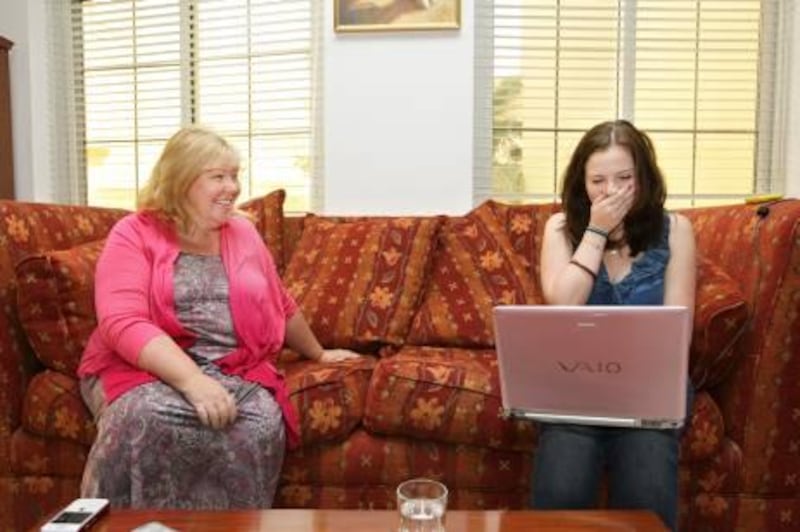DUBAI // As Niamh Merrigan punched in the password on a laptop to access her GCSE results, the clicking of computer keys was the only sound to be heard.
Her mother Donna, who seemed more anxious than Niamh, 16, had barely slept the night before.
"It was all worth it," said the Dubai College pupil, who squealed with excitement when she saw seven A*s and two Bs on her report card yesterday.
"I tried not to think about it too much before today and was waiting to get excited. I had set myself a personal target and have overreached that."
Similar scenes were repeated around the country when pupils at British curriculum schools received their General Certificate of Secondary Education (GCSE) results yesterday.
Pupils wrote exams in nine subjects between late April and June to qualify for continuing to their A levels.
Niamh said she chose chemistry, physics, mathematics, English language, English literature, information and communications technology, French and drama for a variety.
"My first loves are science, maths and drama and I will continue them in the next year," said Niamh, who wants to study medicine at university. "It gives me an opportunity to experience everything."
Graham Penson, a spokesman for Dubai College, said the results were equal to those achieved by the top schools in the UK.
More than 80 per cent achieved an average pass rate between A* and A, compared with the UK average of 23.2 per cent.
"This is a reflection of the hard work of the pupils, teacher and constant support from the parents," said Mr Penson.
Last year, the school found itself among the top 20 elite state schools and top 40 independent schools. Mr Penson said this year would be no different.
"We expect these results to continue to place us in the top division," he said.
In Abu Dhabi, the principal of Cambridge High School, Peter Lugg, said the scores achieved were the school's best, with 88 per cent pupils achieving five A* to C grades.
"That places us very well on the league tables," said Mr Lugg.
The school follows an international form of GCSE called IGCSE, the results of which were made available last week.
Anushree Rai, 16, achieved eight A*s and two As in her IGCSEs but said she had expected those scores.
"I can honestly say academics does not come naturally to me and I have to work really hard to achieve top marks," Anushree said. "I had started working for my Year 11 the summer before, taking extra lessons and revising them constantly."
She said she was now working towards achieving perfect scores to get into one of the Canadian universities on which she has her hopes set.
At the English College in Dubai, where 88 pupils wrote GCSE exams, most also received grades between A* and C. "The quality teaching, resources, and most of all the competitive spirit of pupils here and the desire to have good careers pushes them to perform," said Allan Forbes, the head teacher.
The UK's Joint Council for Qualifications, a body that represents most schools offering GCSE, said pupils were increasingly choosing core subjects such as sciences and mathematics. School heads in the UAE said while those subjects were still a top choice for pupils, schools had started to diversify their programmes and offer subjects according to demand.
Mr Forbes said schools had to be sensitive to the needs of the pupils.
"You cannot just have academic subjects, so we recently introduced leisure and tourism and want to start a media studies programme too," he said.
Critics in the UK say many schools opt for "soft" courses to improve their rankings.
But Niamh and Anushree agreed there should be more subjects on offer, as it improves the chances of getting into a university.
"If you learnt music at high school, and play an instrument, it counts as an extra-curricular as well," said Niamh.
Anushree said the GCSE board also offered psychology and sociology, which many schools in the Emirates do not.
"And if they aren't taught, then students cannot really do what they want to do sometimes," she said.






